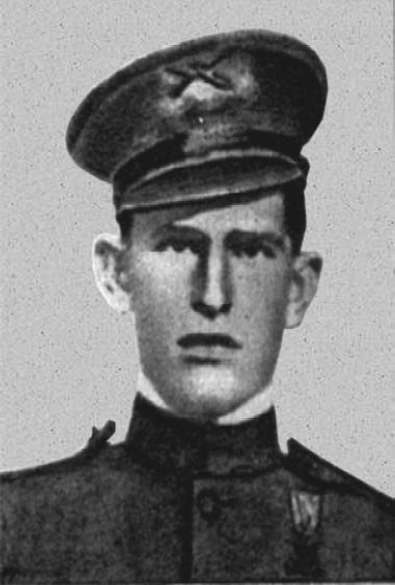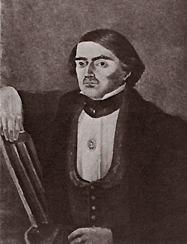School History
Opened during the 2002-03 school year on the site of the original Ruiz Elementary, and named jointly for two West Side schools that merged upon completion of the new campus.
Namesake David Barkley was a San Antonian who lost his life in World War I and posthumously was awarded the Congressional Medal of Honor, while Francisco Ruiz was an early San Antonio school teacher and signer of the Texas Declaration of Independence.
 David Bennes Barkley, also known as David B. Barkeley Cantu (March 31, 1899 – November 9, 1918), was posthumously awarded the Medal of Honor for his heroic actions during World War I in France. After successfully completing a scouting mission behind he swam back across the Meuse River.
David Bennes Barkley, also known as David B. Barkeley Cantu (March 31, 1899 – November 9, 1918), was posthumously awarded the Medal of Honor for his heroic actions during World War I in France. After successfully completing a scouting mission behind he swam back across the Meuse River.
Barkley was born in Laredo, Webb County, Texas to Josef Barkley and the former Antonia Cantu. He grew up with his Mexican-American mother and younger sister after his father left the family. He enlisted in the Army when the United States entered what was then known as the Great War. He used his Anglo father's name to avoid being segregated into a non-combat unit.
As a part of Company A, 356th Infantry, 89th Division in France, he and Sergeant M. Waldo Hatler swam across the Meuse River near Pouilly-sur-Meuse to get behind German lines and gather information about troop strength and deployments. They were able to gather the needed information; however, returning across the river, Barkley was "seized with cramps and drowned". (This is the exact wording from his citation, duplicated below.) Sergeant Hatler survived to bring the information back to their unit.
Barkley was awarded the Medal of Honor for his actions, one of three Texans to be awarded the Medal of Honor during World War I. Additionally, France awarded him the Croix de Guerre, and Italy the Croce al Merito di Guerra.
Private Barkley lay in state at the Alamo, the second person to ever receive this honor. He was then buried at the San Antonio National Cemetery.[4]
When information was desired as to the enemy's position on the opposite side of the Meuse River, Pvt. Barkeley, with another soldier, volunteered without hesitation and swam the river to reconnoiter the exact location. He succeeded in reaching the opposite bank, despite the evident determination of the enemy to prevent a crossing. Having obtained his information, he again entered the water for his return, but before his goal was reached, he was seized with cramps and drowned.
Barkley has received three notable posthumous recognitions. In 1921, an elementary school in San Antonio, Texas, was named in his honor. On January 10, 1941, the U.S. Army installation, Camp Barkeley, was named in his honor. A clerical error resulted in the discrepancy in spelling.[5] Finally, in 1989 when his Hispanic background was discovered, Barkley was recognized as the U.S. Army's first Hispanic Medal of Honor recipient.
 José Francisco "Francis" Ruiz (ca. January 29, 1783 – January 19, 1840) was a soldier, educator, politician, Republic of Texas Senator, and revolutionary.
José Francisco "Francis" Ruiz (ca. January 29, 1783 – January 19, 1840) was a soldier, educator, politician, Republic of Texas Senator, and revolutionary.
Ruiz was born in San Antonio de Bexar in the interior province of Spanish Texas, to Juan Manuel Ruiz and María Manuela de la Peña.
Appointed the first schoolmaster of San Antonio in 1803, he designated as the first school a house acquired by his father, on Military Plaza. This house was carefully reconstructed in 1943 and moved to the grounds of the Witte Museum, where it is still used for educational purposes.
In 1805 Ruiz became a city councilman, or regidor, in San Antonio. He served in various official capacities including city attorney, or procurador.
Ruiz began a long military career in 1811, joining the Bexar Provincial Militia with the rank of lieutenant. He joined the Republican Army at Bexar and took part in failed revolution from Spain in 1813, fighting at the battle of Medina on August 18. Forced into exile from Texas until 1822, Ruiz returned after Mexico won its independence from Spain. He was ordered by the Mexican government to make attempts at peace with the hostile Native American tribes of the North, the Comanches and the Lipans. Appointed to the mounted militia upon his return, he successfully led a peace treaty delegation of Lipans to Mexico City later in 1822. The next year, Ruiz received a promotion to army captain, unassigned, with the rank of lieutenant colonel, receiving confirmation of his commission in 1825. He was sent to Nacogdoches in December 1826 to help put down the Fredonian Rebellion, receiving command of that detachment in April of the next year.
Ruiz was a member of the Comisión de Límites (Boundary Commission), which was assigned to explore areas of Texas following the Adams-Onís Treaty of 1819. This commission left Mexico City on November 10, 1827, under the command of General Manuel de Mier y Terán. Ruiz returned to Bexar in 1828, where he commanded the famed Second Flying Company of San Carlos de Parras, which established Fort Tenoxtitlán in 1830.
In the fall of 1828, Ruiz led the Mier y Teran group of 30 Mexican soldiers and commission members, including naturalist Jean-Louis Berlandier, on a bear and buffalo hunt on open lands northwest of San Antonio, with the cooperation of local Comanche leaders Reyuna and El Ronca. From November 19 to December 18, Ruiz and a military party explored the silver mines on the San Saba River. During this time, he wrote his Report on the Indian Tribes of Texas in 1828, preserved in the Rare Book and Manuscript Library at Yale University. An insight into the trust Ruiz garnered with the Indian tribes of Texas can be found in the Shawnee tribe's reference to him as "a good man no lie and a friend of the Indians."
Ruiz retired from the military at the end of 1832.
Ruiz allied himself with the Texas Revolution in 1835 and traveled to Washington-on-the-Brazos in late February 1836, as a delegate to the Convention of 1836. There on March 2, 1836, Ruiz, along with his nephew José Antonio Navarro, signed the Texas Declaration of Independence - the only native Texans among the fifty-nine men to sign this historic document.
During the revolution he was an outspoken supporter of independence, and he eloquently wrote to his family, "Under no circumstance take sides against the Texans, for only God will return the territory of Texas to the Mexican government."
Ruiz's son Francisco Antonio Ruiz, San Antonio mayor or alcalde, at the time, was an important eyewitness to the Battle of the Alamo, having been placed under house arrest at his San Antonio home by Antonio López de Santa Anna and later forced by the Mexican dictator to identify the bodies of the deceased after the battle.
José Francisco Ruiz represented the Bexar district as its Senator in the 1st Congress of the Republic of Texas. He died in 1840 and was buried in his beloved San Antonio.